Supreme Court Rulings Rocked — and Rallied — the 2022 CAA Amplify Summit
- Oops!Something went wrong.Please try again later.
- Oops!Something went wrong.Please try again later.
- Oops!Something went wrong.Please try again later.
- Oops!Something went wrong.Please try again later.
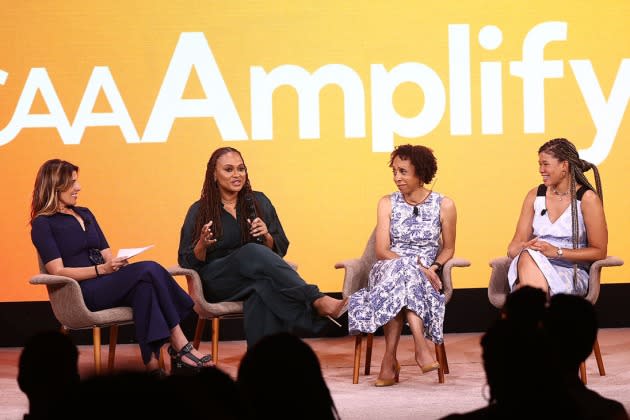
There is a Planned Parenthood in South L.A. five minutes from USC, where Storm Reid goes to college.
“I have friends who have been in situations where they’ve had to go to Planned Parenthood,” the Euphoria star said in a conversation with Ava DuVernay and Nina Shaw on Thursday afternoon in Ojai. “That right could possibly be taken away from the people I care about and people who don’t have the resources to be able to be a normal young human and make a mistake or whatever the case may be.
More from The Hollywood Reporter
CAA Amplify's In-Person Summit Returns: "A Place to Build Community, Reconnect and Recharge"
Universal Releases 'Nope' Featurette Showcasing Diverse Below-the-Line Crew
“The [possibility] they don’t have the ability to have a choice of what they do to their body is devastating,” Reid continued, beginning to cry onstage. “I hate calling myself an activist because I’m not on the ground doing the work activists do, but I try through my art to choose projects and create projects and even watch projects that are saying something. And just because something is not directly affecting me, the fact that it’s directly affecting someone else, [I choose] to do something.”
Reid, DuVernay and Shaw were speaking at the CAA Amplify summit, an in-person gathering that had been delayed for two years, in the works for months and arrived one day before the Supreme Court overturned Roe v. Wade, the landmark 1973 decision that gave constitutional protection to abortion.
From Wednesday’s welcome dinner through the conclusion of the general sessions at the end of the day on Thursday, Amplify had been an intimate, invite-only retreat for the 200 executives, creatives and thought leaders to learn about social and business-relevant issues both urgent and timeless and to find communion among allies. But on Friday morning, as the attendees convened for their send-off breakfast at the Ojai Valley Inn, Amplify became a mission control center.
Amid the “anger, numbness, disbelief and fear for what’s next,” as one guest described it, there was also hope and a call to arms, according to others. Attendees, feeling not just inspired but activated by yesterday’s sessions, huddled in groups to discuss what was possibly needed: Had Hollywood not done enough storytelling to shift the narrative on reproductive rights? Should productions refuse to film in states with abortion bans? How should men step up? One lawyer brought her laptop to breakfast, poring over Justice Samuel Alito’s majority opinion line by line. Others worked their phones to strategize with colleagues beyond Ojai about how to respond on all fronts, fundraising for tight races in local, state and federal midterm elections and for specific nonprofit and advocacy organizations.
“Our network is fierce, and we need to be,” CAA president Richard Lovett had said in his remarks to open the general sessions on Thursday morning, when the court also struck down a New York gun control law, a ruling that was later referenced by Massachusetts’ U.S. attorney Rachael Rollins during a panel conversation. “Unfortunately, the forces of evil in this country are gaining strength: racism, the Big Lie, those who’ve made it their lives’ work to dismantle Roe v. Wade. We have to be more focused, more driven. It’s great to make a declaration and say the right things, but we are now five years in, and we promise we will never stop.”
Amplify’s invited attendees this year included MACRO Film Studios president James Lopez; ICM Partners co-head of talent Lorrie Bartlett; producers Effie Brown, Julie Oh, Heather Rae and Bird Runningwater; showrunners Natalie Chaidez and Tanya Saracho; actors Sasha Calle, Raul Castillo, Daniel Dae Kim and Harry Shum Jr.; ESPN host Bomani Jones; YouTube star Liza Koshy; Gold House co-founder and CEO Bing Chen; Marginal MediaWorks founder and CEO Sanjay Sharma; Enfranchisement Productions founder and CEO Brad Jenkins; Warner Bros. Discovery senior vice president of equity and inclusion Samata Narra and Muslim Public Affairs Council Hollywood Bureau director Sue Obeidi. Both Lovett and CAA cultural business strategy co-head Ruben Garcia, who closed the session late Thursday afternoon, gave special acknowledgement to one particular guest: Christy Haubegger, who architected Amplify when she was head of multicultural business development at the agency. She left CAA in 2019 to become WarnerMedia’s chief inclusion officer, a position that was recently eliminated in its current incarnation as part of the Discovery merger’s restructuring.
Thursday’s daylong general sessions alternated between moderated conversations and solo “storyteller” spotlights. Highlights from the entertainment industry-related sessions are below.
McKinsey partner Sheldon Lyn and former manager Nony Onyeador (now vice president of operations at Endeavor Content), moderated by The Black List founder and CEO Franklin Leonard
Leonard led a sharp conversation about the implications behind the consulting firm’s landmark March 2021 report that revealed Hollywood is leaving $10 billion in revenue on the table annually as a result of its refusal to remove its anti-Black systemic bias. Before his entertainment career, Leonard was an analyst at McKinsey, and after the firm announced a commitment of $200 million worth of pro bono work to advance racial equity and Black economic empowerment in July 2020, the Black List CEO emailed an old friend at McKinsey and only half-kiddingly suggested the company use some of that pledge to study Black representation in the entertainment industry.
Speaking with Lyn and Onyeador, two of the authors of the ensuing report, Leonard unpacked some of its key findings, starting with the cognitive dissonance of films with Black offscreen talent continuing to receive smaller budgets despite having proven to generate on average higher returns on investment. “It’s a self-fulfilling prophecy,” Onyeador explained of the studio mindset. “‘That person before you did it for 10 percent less, so you should as well,’ instead of, ‘This performed really well, I wonder what would happen if we gave you more money?'”
Onyeador said that filmmakers without power and leverage accept fewer resources just so they can make their projects, so it’s a matter of reducing risk perception among the ranks who hold the greenlight power and the purse strings. “We found a surprising lack of reliance on hard facts and metrics, and more reliance on legacy experience and gut,” added Lyn of how Hollywood gatekeepers make their decisions. “It comes back to how much the industry uses data and facts to allocate capital.”
“You mean ‘misuse’ or ‘not use’?” quipped Leonard, the provocateur to the consultants’ more measured takes. In explaining why the industry hasn’t leaped to capture the $10 billion upside revealed in the report 15 months ago, Lyn noted that one complication is that Hollywood is an ecosystem, not a single entity, and one with habits of process that have been “calcified” for nearly a century.
Lyn did, however, lob at least one pointed question himself. Returning to the finding that entertainment leadership is actually whiter (92 percent of C-suite film executives are white) than many other industries, including finance, consumer goods, transportation and energy, he noted that non-Hispanic whites currently make up about 60 percent of the U.S. population, according to the last census. “That’s 1.5 times a fair share,” he said. “Unless you believe there’s something innate in talent [among certain races], then something is amiss. We’ve heard about affirmative action among minorities, but it’s worth exploring how you go from 60 percent of the population to 90 percent of the top jobs.”
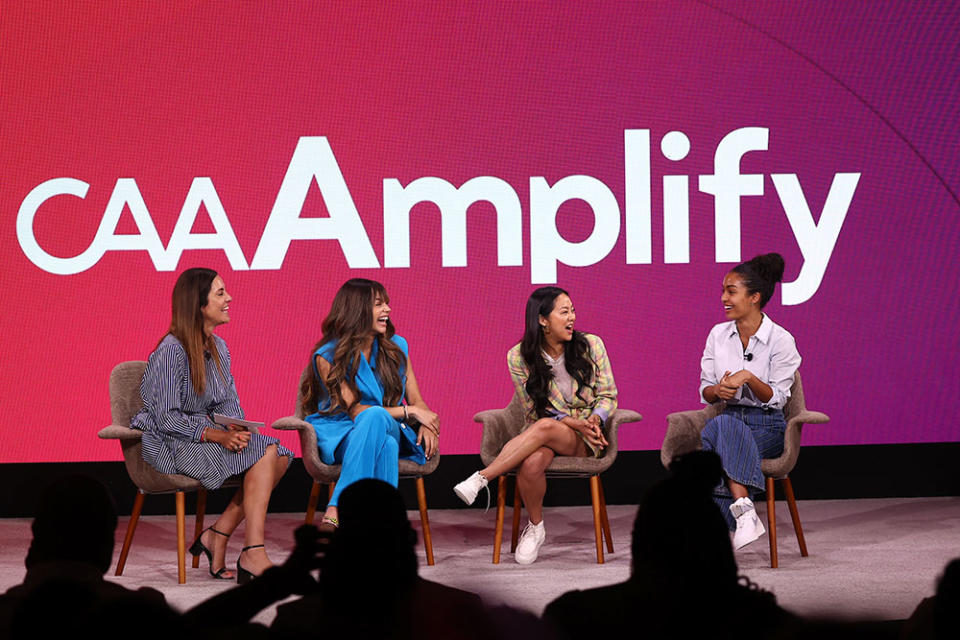
Courtesy of Will Navarro
Actors Leslie Grace, Stephanie Hsu and Yara Shahidi, moderated by CAA motion picture talent agent Tracy Brennan
Hsu, who is having a breakout year with her performance in Everything Everywhere All at Once, made a number of comments that resonated in the room, with multiple speakers returning to her points throughout the day. “I’ve been walking around with huge imposter syndrome my whole life,” she confessed, adding that doubts plagued her even when she made it to Broadway five years ago. “I felt like it was an accident, because I never saw a version of [someone who looked like me on this path]. I read scripts and what I see in my mind is not me.”
“I feel that, heavily,” agreed Grace, the Latin Grammy-nominated singer who made her acting debut in In the Heights last summer before being cast as Batgirl.
“It’s embarrassing,” Hsu continued. “To imagine it for myself takes a different labor and rigor. I walked into a room recently and looked around [at the other auditioners] and was like, ‘Oh, yeah, I would be the other choice… if it went that way.’
“Right now I’m going through a journey trying to decentralize whiteness in my mind,” said Hsu, who’s been fielding an influx of interest since A24’s highest-grossing film was released this spring. “Thinking of diversity in Hollywood, when someone just gets in that door, [people say], ‘You’re so lucky, this rarely happens.’ That is a crazy thing to say to a person: ‘You’re so lucky; there’s one chair, and you got it!’ There’s a growth I think is happening, and I’m excited for no one to feel like they’re so lucky they got to be here.”
Grace and Shahidi, as light-skinned Black and brown women, also discussed the need for the industry to understand the breadth of diversity within their racial and ethnic groups they hail from. “I’m not the face of Black people or experiences, and by hiring me, you’re not achieving something by using me as the Black Iranian Gen Z person. How are you not acknowledging the fact that there is so much internal diversity within our community?” Shahidi said. “As someone whose big old head is on the billboard, I’ll get flak for something an exec team hasn’t thought through. I’m thankful for my mom, the one who pulls them aside and says, ‘There are so many people being excluded.’ There are so many more nuanced conversations to be had, so people don’t feel accomplished by just handing one opportunity to people like us.”
The Black-ish and Grown-ish star graduated last month from Harvard with a specialized concentration that combined the social studies and African American studies departments: Black political thought under a neocolonial landscape. (She credited Leonard, a fellow Crimson alum, for inspiring her to create her own major.) As a teen sitcom star, she enrolled in college in part because she knew that onscreen representation was just “one part of the conversation” about inclusion, and her studies will motivate her work as an actor and producer moving forward. “School reminded me that we’re informing narrative,” said Shahidi, who wrote her senior thesis on the work of playwright-turned-cultural theorist Sylvia Wynter. “[Wynter wrote that] one thing Western countries have done is maintain power over the definition of human.”
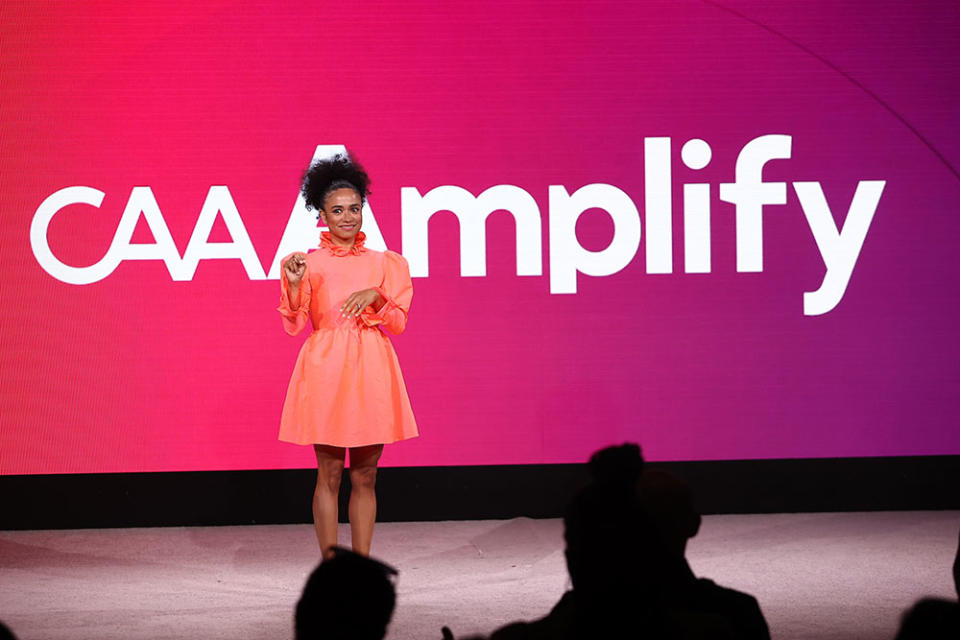
Courtesy of Will Navarro
Storyteller: Lauren Ridloff
With her interpreter providing spoken translation offstage (another provided ASL translation during all the other sessions), the Eternals star, whose character’s superpower is generating sonic booms that don’t harm herself, introduced the audience to the concept of “Deaf gain.”
“It’s a playful, fun phrase that flips the narrative of ‘hearing loss’: Deaf gain,” she signed. For example, she lives in New York across from a fire station. “A peaceful place for me to live, I love it!” Another: crying babies on red eye flights. “No worries, no problem! I can still sleep. Deaf gain!”
Ridloff said director Chloé Zhao’s enthusiastic response to learning about Deaf gain on the Eternals press tour made her realize the character development potential if deaf people had been involved earlier in the process behind the scenes. “How much more badass could we have put into my character of Makkari?” she wondered. “We need more deaf people involved in story development. That’s when true representation happens.”
The actor noted that as much as her own success and that of CODA have broken ground with onscreen representation, those projects did not have deaf writers. “My dream is to portray and introduce to the world a deaf woman who happens to be Black and Mexican,” said Ridloff, who will get to do just that as not just a star but also executive producer (alongside DuVernay and Joshua Jackson) of an untitled romantic drama that already has received a three-season script-to-series commitment at Starz. “That is an opportunity to bring deaf writers into the room. There’s already a deaf EP in the process. So that sonic boom is making an impact.”
Storyteller: Crystal Echo Hawk
The founder and executive director of the racial and social justice organization noted that despite the popularity of “Native” aesthetics and ancestry (“everyone wants to do their 23andMe”), the dominant narratives around Indigenous people is that “we’re a vanishing, dying race, we’re drunks, we’re women to be conquered and our land is to be taken.”
Echo Hawk noted recent gains across multiple sectors that were the result of decades of efforts: changing the names of the NFL’s Washington Guardians and MLB’s Cleveland Guardians, helping get U.S. Department of the Interior secretary Deb Haaland nominated and confirmed as the nation’s first Native American cabinet secretary, and the critical success of rookie series Reservation Dogs and Rutherford Falls.
“But it’s not enough. We need to widen the circle of representation not because we ought to, but because our stories are good,” said Echo Hawk, exhorting the audience to champion the stories created by “the original peoples of this land.”
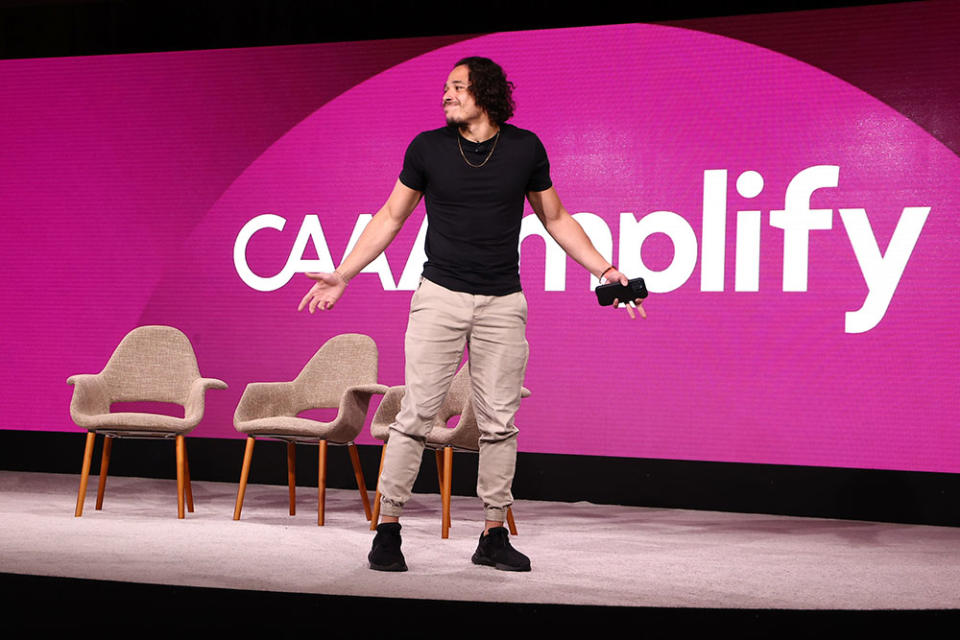
Courtesy of Will Navarro
Storyteller: Anthony Ramos
Multiple attendees, including Garcia, called the In the Heights star’s session the highlight of the day. Tossing aside the bullet points typed into his phone, Ramos candidly shared his journey of growing up the child of a drug-addicted father and alcoholic mother in the projects in Bushwick, Brooklyn, and how the perseverance of his high school teacher Sara Steinweiss changed his life.
The details of the narrative — minus Ramos’ inimitable personal delivery — can be found in THR‘s cover story profile from last year, save for the most recent rousing development: A little over a decade after Steinweiss submitted his name to the Jerry Seinfeld Family Foundation, which gave him a four-year scholarship to attend the American Musical and Dramatic Academy (broke, he was otherwise Navy-bound), Ramos now is helping other kids pay for college. Steinweiss runs his scholarship, which is administered through Scholarship Plus, an organization providing low-income New York City students with four-year college scholarships. The organization’s executive director, Kate Fenneman, was running Seinfeld’s foundation and was the one who shared tears with Ramos when he was a high schooler sitting across from her, asking for a shot at a better future.
“Thank God I’ve been blessed to do things, but none of that would be possible without them and without [other teachers],” Ramos said. “Now I’m trying to be hope for somebody else. The young people, we can’t ignore them. We’re talking about all these stats and it’s important, but those kids are the ones who are going to change that shit.”
Director Ava DuVernay, Del Shaw founding partner Nina Shaw and actor Storm Reid, moderated by CAA motion pictures co-head Maha Dakhil
Beyond Reid’s empathy and grief over the impending loss of reproductive rights for the vulnerable, the post-lunch conversation was marked by the strong intergenerational bond among the women onstage. In 1999, after the trades announced then-publicist DuVernay opening her own shop, she received a call from “the Nina Shaw,” who was by then already a legal legend in town.
“You’re young, I barely know you, you probably don’t have money, but I’m here,” Shaw told her. “Who’s doing your contracts?”
For the next decade, it was Shaw — pro bono, DuVernay told the crowd, to the attorney’s chagrin (although anyone who already knows Shaw is familiar with her generosity of spirit). In turn, DuVernay has now taken younger women under her own wing, chiefly Reid, whom she cast in her breakthrough star turn in A Wrinkle in Time. “Storm Reid feels for me the closest to any kind of daughter figure for my life. Her mother’s been so generous in letting me have a little bit,” she said. “I’m always here to hold you up in film and life, and that is what Nina has meant to me.”
For her part, Shaw remarked that she has made the choices she has — opening the door and advocating for herself and others — because it has always been necessary. “I hear you [DuVernay] talking about Storm; I think about [Eve’s Bayou director] Kasi Lemmons talking about Jurnee Smollett the same way,” she said. “That’s something we do for each other as Black women, we have a sense we will take care of each other.
“I just felt like if I went away, I was going to close the door and there would be no one else like me,” Shaw continued. “I felt like if I didn’t stay long enough to make it competitive for clients, I didn’t have hope there would be another person like me willing to do it.”
DuVernay, Shaw and Dakhil all praised Reid for what they considered an uncommon work ethic among her peers. While the younger actor acknowledged that her drive comes in part from desiring to make an impact on others, she also gently defended her generation. “There needs to be more grace with young people,” she said. “As you said, Ms. Maha, we are trying to make things happen and figure it out.”
Authors and screenwriters Tomi Adeyemi (Children of Blood and Bone) and Soman Chainani (The School for Good and Evil), moderated by CAA literary agent Cindy Uh
The two fantasy writers engaged in what came closest to conflict on the Amplify stage when Adeyemi (playfully) took umbrage to Chainani’s disdain for the binary hero/villain characterizations in Disney’s animated classics. His desire to upend traditional “Western” notions of heroism led him to pick up the pen and create narratives where the “good” and “bad” guys aren’t prescribed. “I’m trying to give Voldemort and Vader equal pages and backstory,” he said. “You decide who to root for.”
Meanwhile, Adeyemi’s motivation to create came from the desire to see herself in stories, an oft-heard refrain from creators from marginalized backgrounds. “I knew the psychological ramifications of never seeing myself in Harry Potter or my anime shows. I came in with the mission that I don’t want girls to spend 10 years not living in their own imagination,” she said. “I’m also here as revenge to people who tweeted mean things to Amandla Stenberg for The Hunger Games 10 years ago. Oh, you don’t like one Black character?”
However, Adeyemi added that nobody asks artists like Quentin Tarantino or Aaron Sorkin about the role diversity plays in their work. “I’m a storyteller. Talk to me like you talk to J.R.R. Tolkien,'” she said, invoking Hsu’s comments from earlier. “I look at Aaron Sorkin [as a role model] because I’m told he’s paid the most.”
The two authors also talked about the different routes they took to getting to adapt their own work for the screen. Chainani — who noted earlier that Disney antagonists like Scar, Jafar and Ursula were always depicted with slightly darker features, and in contrast the Netflix feature based on his book will have actors like Laurence Fishburne and Kerry Washington as the authoritative “good” characters — was a trained screenwriter who turned to novels in order to be able to control the IP. “Being able to be the first one in ultimately gets it on the right track,” he said. “It can’t be reconceived by someone to rip out the roots before it begins.”
By contrast, Adeyemi had a much longer, winding path. Her hit novel was optioned in 2017 by Fox 2000 in one of the biggest deals ever for a YA debut, but after Fox was acquired by Disney the following year and Fox 2000 dissolved, the project was picked up by its Lucasfilm division. During that time, various screenwriters were hired to work on the script, and the studio declined to allow Adeyemi to attempt it herself. It wasn’t until Lucasfilm dropped the film last fall and it landed at Paramount this January that Adeyemi was finally given the creative reins. “I had to raise my hand and say, ‘Hey. Hey. Hey, hey, HEY!'” said the 28-year-old. “I’m young, a woman, dark-skinned, but there were all these people who were fucking up my shit. I’ve written six drafts in six months and we’re finally moving forward. It went right when I got to write.”
Banijay chair of the Americas and Endemol Shine Holdings president and CEO Cris Abrego, in conversation with CAA TV lit head Praveen Pandian
Abrego was an Amplify speaker in 2017 and hasn’t missed a summit since. One of the highest-ranking Latino executives in the business, he’s no stranger to conferences — MIPCOM, NATPE — but Amplify is special to him because he goes “from being the only in the room to being the room.”
He recalled the second summit, when then-NAACP Legal Defense Fund president Sherrilyn Ifill sounded a very particular — and now prescient — alarm: “If we don’t act, they’re going to roll back Roe v. Wade,” she told the Amplify attendees in June 2018, weeks before President Donald Trump nominated Brett Kavanaugh to the Supreme Court.
“It was really eye-opening and for me, it specifically refocused my purpose,” Abrego continued. “Amplify set the fuse again, especially from where I was sitting at that point in my career, to be really impactful.”
Hailing from the town of El Monte east of Los Angeles, Abrego grew up without a single connection to anyone in the industry. After college, he could not get hired in town: “The person interviewing me would ask generic questions like, ‘Where’s your favorite place in Europe?’ Never been. ‘Where did you camp?’ Where I’m from, that means juvenile hall.”
He finally landed a job with a two-hour commute at a TV station in Palm Springs, where he began an ascent that had him resonating strongly with Hsu’s morning comments about imposter syndrome. “I thought I was alone in that,” he said. “Speaking again of Sherrilyn Ifill, she talks about how the legal system wasn’t built for her. The entertainment system wasn’t built for me. She talks about the role of the infiltrator. If you want to create impact, you have to do it from the inside. Shit, I’m not an imposter — I’m a fucking spy!”
Invoking Jay-Z’s famous lyric — “I’m not a businessman; I’m a business, man” — he challenged the crowd: “How many of us are the business? The last few years, everyone rushed to announce the person of color they made a deal with. It’s great to take advantage of this time, but we have to level up. We have to realize we are the business.
“I look at why there aren’t more Black, brown, Asian media companies. We’ve never been trusted with the money. We haven’t been properly capitalized,” he continued.
Abrego called out the industry’s flagging enthusiasm since the performative pledges of 2020. “If you look at every announcement that came out that summer, I bet 50 percent are gone. Even in my company, the people who came in to get involved, by January, February, half of them were out,” he said. “A high-level exec at my company was like, ‘Maybe we should rethink if we really need to [launch another initiative].'”
The former high school wrestler — ranked fifth in the nation — now wields his tenacity from his place of authority, and he’s focused on impact. “We need to be able to build infrastructure. Mentoring, pipelines are all great, but I don’t get involved unless it creates employment,” he said, calling back again to Hsu’s remarks. “‘Here’s a chair?’ Fuck, I own a thousand chairs. My company makes chairs and tables. I appreciate it, but we’re good. We’re going to own this business.”
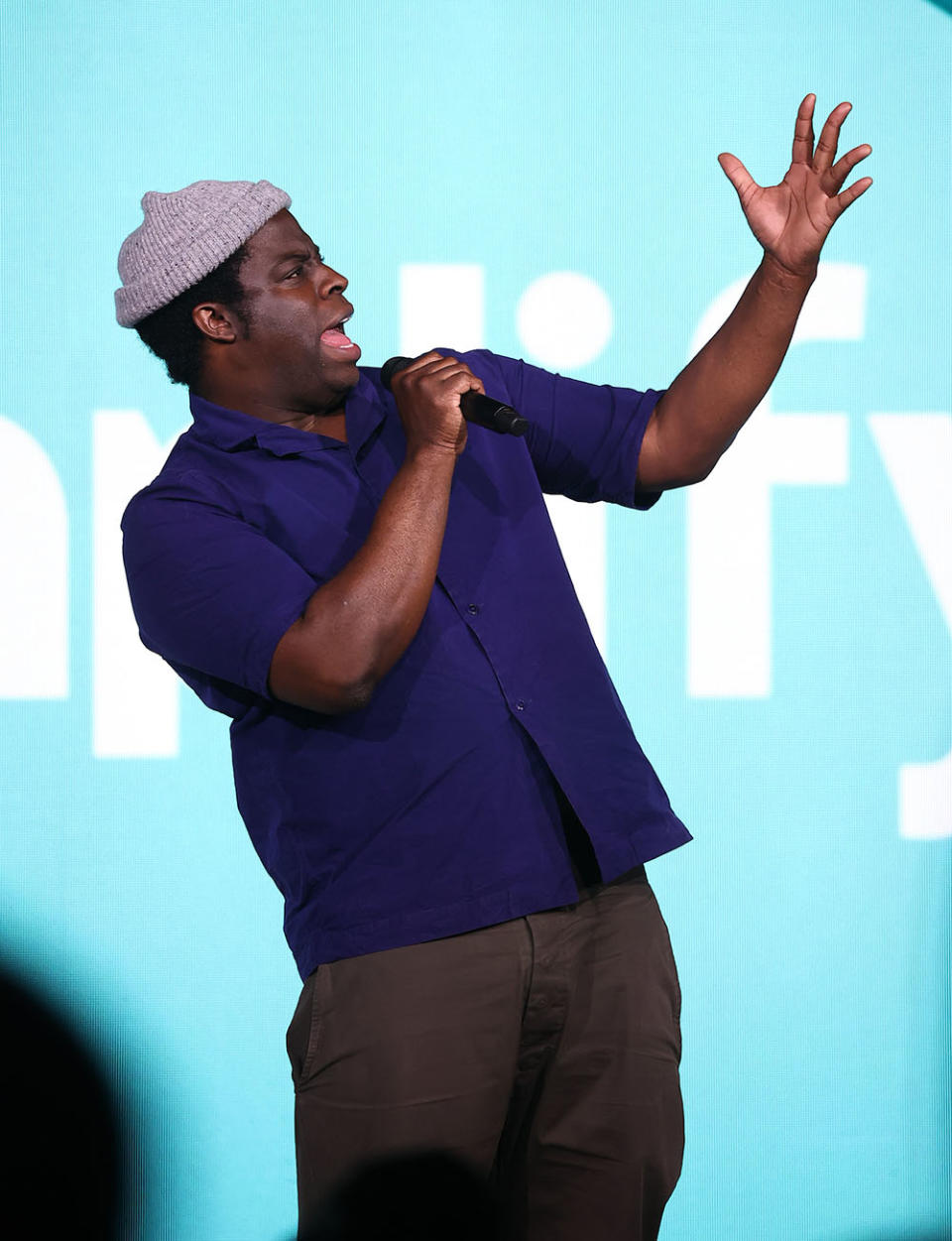
Courtesy of Will Navarro
Storyteller: Jeymes Samuel
The filmmaker and musician gleefully ignored the timer onstage as he spoke off the dome, delivering an exuberant exhortation to the Amplify crowd to embrace their identity as “Black gods” and telling a profanely funny story about the Italian film producer — whom he named — who told him The Harder They Fall was unmakeable as a Black Western debut feature.
“It’s too big,” he told Samuel in 2017. “I’ll give you $5 million. Make something smaller. It’s successful, I’ll give you $6 million, and maybe your seventh movie is The Harder They Fall.”
Four years later, Samuel texted the producer before the trailer dropped to tell him the check the Internet in an hour. ” As soon as somebody tells you it can’t be done? Do it. Do it with vigor,” was the moral of his lesson. “Let your spiritual self jump out of your physique and slap that person to kingdom come.”
And with that, he literally dropped the mic to a rousing ovation.
The general sessions concluded with a number of ad hoc addresses from attendees who were invited to share their reactions from the daylong sessions: Saturday Night Live castmember Ego Nwodim, The Parent Company CEO Troy Datcher, Amazon vp of consumables Carla Vernon, Warner Bros. Discovery’s Samata Narra, Lifetime evp of movies and limited series Tanya Lopez and Daniel Dae Kim.
A special session was added with former Time’s Up CEO Tina Tchen taking the stage with Women’s National Basketball Players Association executive director Terri Jackson to commemorate the 50th anniversary of the signing of Title IX, but also to deliver a somber plea to petition President Biden’s administration to take action to bring home WNBA star Brittney Griner, who has been wrongfully detained in Russia since February.
Griner had traveled to Russia in order to play for her Russian Euroleague team, which she does during the WNBA offseason. “We are serious about supporting women and girls in sport and addressing the pay inequity that leads to so many of our members going overseas when the WNBA season is over,” Jackson said. “Today is 126 [days since Griner was detained]. On the day of the WNBA All-Star Game, it will be Day 143. I pray she is home by then, but the inaction of the administration leads me to believe we may get to the game and not see BG, and she should be an All-Star. I need you to go to WeAreBG.org and tell them to bring BG home.”
Amplify 2022 also featured an exclusive screening of the trailer and a scene from Gina Prince-Bythewood’s The Woman King, storytelling sessions from culture strategist LaTosha Brown, comedian Amber Ruffin (which the press missed coming back from lunch), MLB pro-turned-artist and NFT creator Micah Johnson and author and investor Shaka Senghor, whose note-writing campaign Love, Dad (an activation was set up at the summit) was inspired by the letters of love and encouragement his father wrote to him while Senghor was incarcerated in solitary confinement.
Policy-oriented conversations included discussions on mental health with UFC fighter Khalil Rountree and Nancy Santiago, deputy director of engagement for the office of the U.S. surgeon general (moderated by CAA Foundation executive director Natalie Tran); education with L.A. Unified School District superintendent Alberto Carvalho and Center for Black Educator Development CEO Sharif El-Mekki (moderated by Kaya Henderson, Pod Save the People co-host and CEO of Reconstruction US, which provides K-12 curriculum on Black history and culture); and justice with Southern Poverty Law Center senior fellow Eric Ward, White House senior advisor and former Atlanta mayor Keisha Lance Bottom and Massachusetts’ U.S. attorney Rachael Rollins (moderated by CAA motion picture lit agent Christina Chou).

